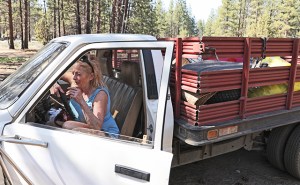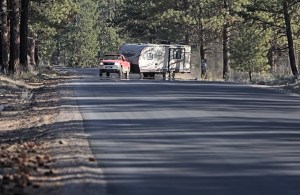Homeless campers pour out of China Hat Road as Forest Service clears camps
Published 2:32 pm Thursday, May 1, 2025

- Forest Service law enforcement officers patrol a gate on China Hat Road during the sweep of homeless encampments off of China Hat Road Thursday in Bend. 05/01/25 (Dean Guernsey/The Bulletin)
When the U.S. Forest Service announced in January that it would be closing 30,000 of Deschutes National Forest southeast of Bend for a wildfire reduction project, Steve Putnam canceled the surgery he had scheduled to remedy his carpal tunnel problems. He started preparing to move from the forest where he had lived since 2020.
He was still scrambling to move on Wednesday afternoon, with the closure set to go into effect in less than 12 hours. Hoisting heavy stumps and lugging tires was not the treatment 63-year-old Putnam needed for his other ailments — a chronically aching back and neck, along with a pulled tendon in his leg.
“I’m limping around when I should be taking it easy on it,” Putnam said. “We gotta get out.”
Putnam and other homeless people living in scattered encampments in the woods near China Hat Road scrambled to collect belongings and repair vehicles to leave by Wednesday evening, facing the threat of a $5,000 fine and jail time for violating the closure.

Steve Putnam deconstructs his shelter as he works to mobilize his RV prior to moving out of his camp off of China Hat road in Bend. 04/30/25 (Dean Guernsey/The Bulletin)
The sweep marks the dismantling of one of the largest and longest standing homeless encampments in Central Oregon — and what advocates said is the largest known homeless encampment on federal land in the country — that simmered under the purview of officials for years.
The Forest Service notified campers of the planned closure more than three months ago, and outreach groups worked to connect people with housing and services in the weeks leading up to the time when they would no longer be allowed.
But Thursday’s official closure came without a coordinated effort from service providers in their official capacity, and without an alternative place for people to legally take their vehicles, leaving lingering uncertainties about the impacts of the sweep and several other planned encampment closures on public land in Deschutes County.
Forest Service law enforcement officers reportedly closed the gate blocking access to China Hat Road at around 3:30 a.m. Thursday morning. Advocates and outreach workers estimated 40 to 60 people remained behind the gates as of Thursday morning.
Many of those who did leave remained parked just outside the closed gate waiting to head back in to retrieve remaining vehicles and belongings. The Forest Service granted a 90-day grace period for people to re-enter the closed area with an escort for that purpose. Officers swung open the gates to let people in dozens of times Thursday, although they did not allow a service provider van carrying supplies to enter the forest.

Cassie Griffee and her husband Adam rush to organize their belongings prior to moving out of their camp off of China Hat road in Bend. 04/30/25 (Dean Guernsey/The Bulletin)
Tensions had been building in recent weeks between China Hat residents and law enforcement, with the National Homelessness Law Center warning of a “potentially catastrophic clash” between the two. But Thursday morning passed without fines, citations, arrests or physical force.
“Our law enforcement officers are approaching this closure with compassion,” said Kaitlyn Webb, a spokesperson for the forest service. “Our officers want to support individuals with voluntary, successful transitions out of the closure area with their belongings to the extent possible.”
Making way
The closure and sweep will make way for the Cabin Butte Vegetation Management project, a 34,000 forest health and wildfire risk reduction effort that will keep a huge area of forest closed for at least a year.
Advocates led a press conference in front of local, state and national media Thursday morning with a succession of speakers from local and national advocates to a homeless former China Hat resident and a religious leader.
Members of the same group sued the Forest Service in April hoping a judge would block the closure to allow people more time to move out. The judge denied the request on Tuesday.
Advocates railed against sweep, saying it would result in mental and physical trauma for homeless people and an influx of people sleeping in their cars on the streets of Bend.
Chuck Hemingway, who helped file the lawsuit on behalf of China Hat residents, said he hoped the sweep would be a “beacon call for Central Oregon.”
“We have a large population of unhoused, mostly due to circumstances not of their fault or causing, with no place to go,” he said, adding that many people at China Hat are elderly, disabled, or both. “We need to provide a legally recognized location for people experiencing homelessness where they can live with dignity in a safe and secure environment. We hope this might be the start of an effort throughout Central Oregon to bring that to pass.”
People who do not have homes rely on vehicles for a sense of ownership and privacy, said Graham Pruss, an advocate and anthropologist whose research focuses on people living in vehicles and public policy. Vehicles also allow people to keep their pets and live with partners, he said.

Penny Gartner is emotional while helping friends move their belongings from camps off of China Hat road in Bend. 04/30/25 (Dean Guernsey/The Bulletin)
“For many people, these vehicles represent their affordable housing,” Pruss said. “They are using their private property to solve the housing crisis.”
Those are some of the reasons why Putnam worked hard to get his vehicle out of China Hat with him before the closure — even though he’s moving into a supportive housing project in Bend. The 33-unit Cleveland Commons is one of several projects developed in the past year meant to help people transition out of homelessness.
An extension on the side of Putnam’s camper trailer was stuck in place Wednesday hours before the closure. Putnam stacked wood and shoveled dirt to allow his friend to push the extension back into place with the bumper of a 1997 red Ford pickup. The pickup hauled the creaking trailer away in a cloud of dust.

Daniel De la Cruz helps to tow Steve Putnam’s trailer from the homeless encampment off of China Hat road in Bend. 04/30/25 (Dean Guernsey/The Bulletin)
“I was one of the lucky ones,” he said.
More shelters
The city of Bend has also been working on building more shelters and safe parking programs. The city has around 517 shelter beds, including more than 200 that don’t have restrictions on entry. Shelters funded by the city of Bend are usually mostly full.
Jessica Dodd and her partner have been homeless at China Hat for five years. Now, they plan to move their trailer to a street somewhere in Bend. But they know they probably won’t be able to stay in one place for very long. In 2022 the city of Bend passed a code banning public camping in the same place for more than 24 hours. Last year it updated the code to include vehicles as camps.
“I don’t like being in town,” Dodd said. “I hate being in town. Now that they’re closing all this off, I don’t know what they expect everybody to do. They’re going to go right back into town where they don’t want them.”
Some said they planned to take their vehicles to Juniper Ridge, another large public land encampment north of Bend, where the city and county are setting up a “temporary safe stay area” to help people transition out of the Juniper Ridge camp, with plans to close it at the end of 2026. Officials have said the purpose of the safe stay area was to help people leave Juniper Ridge — not as a place to go for people leaving China Hat.

A foundation and random belongings left behind after people were forced to evacuate the homeless encampment off of China Hat road in Bend. 04/30/25 (Dean Guernsey/The Bulletin)


